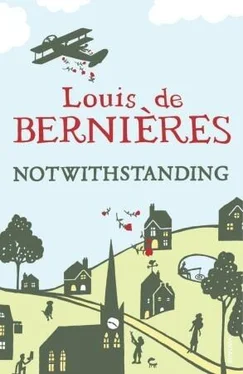Bessie Maunderfield was there, however, cleaning out the hearth on her second day of employment, and already regretting her sore knees. ‘Ah,’ said Piers de Mandeville when he saw her.
She got to her feet and executed a little curtsy, saying, ‘Sir.’
‘You must be new,’ he said.
‘Started yesterday, sir,’ she said.
‘And what might be your name?’
‘Bessie Maunderfield, sir,’ she replied, ‘an’ it may please you, sir.’
‘Maunderfield? Of the Chiddingfold Maunder-fields?’
‘Yes, sir.’
‘Well, Bessie, I am Piers de Mandeville, and I regret to inform you that I am not the son and heir of this house. That honour belongs to my older brother, who is, as we speak, planting tea in a much hotter place where skins are darker, diseases even more foul and languages incomprehensible.’
‘I am pleased to make your acquaintance, sir, and I hope you will find my service satisfactory, sir,’ said Bessie, glancing up at his face and finding herself looking into a pair of humorous grey eyes.
‘I am sure I will,’ he replied. He paused, and added, ‘Did you know that the Maunderfields and the de Mandevilles are supposed to have been related, distantly, once upon a time? The origins of the name are the same, it seems.’
‘I did hear that, sir. People do commonly say it; they say that our side fell on hard times and your side never did, sir. They say it was because of our being greatly in the wrong cause in the Civil War, sir, and our house got terrible burned by fire setters.’
‘Well, Bessie, one day perhaps all will be reversed. The wheel of Fortune might spin and there you’ll have it — lo and behold! — a de Mandeville girl cleaning out the hearth of a Maunderfield as he scrapes on a fiddle in the withdrawing room of a great house in Chiddingfold.’
‘Well, I do hope not, sir.’
‘Really, Bessie? Why not? The thought should give you some satisfaction, should it not?’
‘No, sir,’ said Bessie, ‘I wouldn’t wish cleaning hearths on anyone, sir. Hearths would clean themsen, sir, if it had anything to do with me. Now you must excuse me, sir, I have the parlour to do, and I wouldn’t be wanting the housekeeper to scold me.’
‘Not on your second day, certainly. Indeed, I do excuse you. I am sorry to have detained you with my chatter.’
Bessie bobbed, glanced at him and hurried out with her copper bucket of ash. She set it down on the parlour floor, and clapped her hands together softly in a gentle gesture of delight. She smiled and kneeled to clean out the grating. In the withdrawing room Piers de Mandeville began to play through his James Hook with a light heart.
Love being what it is, Piers de Mandeville contrived to run into Bessie quite often. The best pretext, he found, was to be looking for something that he had mislaid. It gave him a reason to be moving about the house somewhat randomly. He would greet her with ‘How now, my pretty distant cousin?’ or ‘How now, my distant pretty cousin?’ Bessie very quickly realised why he kept losing his possessions and was both flattered and frightened by turns. She could not deny that her heart seemed to flutter to her mouth every time that she saw him. He found himself in a similar condition, merely at the thought of her, and at night, the two of them, she on her palliasse in Chiddingfold, and he in his goose-down bed in Notwithstanding, would exhaust themselves as they slept, on account of the febrile longings and repetitive pretty dreams. It was not long before both of them saw quite clearly that an inevitable intimacy was developing.
One day Piers de Mandeville turned up below stairs, upon a somewhat feeble excuse. Bessie teased him. ‘Now why would my master be looking for his timepiece in the scullery, when he never has any business there?’ to which he replied, ‘Sir Isaac Newton, of late philosophical memory and immortal renown, established it as a universal law of nature that lost objects gravitate inexorably towards places where they would least expect to be found. Objects, my pretty distant cousin, have a natural and innate perversity. In fact, it seems likely that for this reason objects must be feminine, even though, in the French language, merely half of them are.’
‘Could it be that the lost object is indeed of the female kind and that you were looking for a particular maid, sir, and a very likely place to find her might be in the scullery?’
‘I confess it. That is indeed the reason, and I am very glad to have chanced upon you.’ They stood looking at one another for a long moment, and then he found himself stroking her cheek gently with his hand. ‘How very sweet and lovely you are,’ he said quietly, adding, ‘my pretty distant cousin.’
‘You’re not so bad yourself,’ she said, removing his hand, ‘but you must be cautious, sir. Think of all the other servants coming in and out. It wouldn’t do to get caught now, would it?’
‘You’re quite right, Bessie, of course you are, but I think we need to talk about certain things, don’t you?’
‘I would say we do, sir.’
‘Where shall I see you?’
Bessie Maunderfield thought quickly, and said, ‘This evening, sir, have your groom saddle your horse, and tell the family that you are riding to Chiddingfold.’
‘On what pretext, Bessie? What can I tell them?’
‘That’s for you to decide, sir. I shall be walking home, and you will pass me on your horse and turn into the Hurst, and if there is no one about, then I shall follow you in. The Hurst is full of hidden places, sir.’
Somewhat in advance of the hunting season, Piers de Mandeville set off one evening to scout the Hurst for fox earths. He encountered his particular little vixen at a place near one of the ponds where, within living memory, Prince George of Denmark had got bogged down in his carriage on the way to Petworth, and the men of the village had gathered to disembog him. Checking that no one else was about, he dismounted, and together they walked into the wood, he leading his horse by the bridle. The latter was tied to a sapling of ash, and the couple spread his cape on the ground by a little stream, barely a pace wide, which in those days was populated by diminutive brown trout.
They sat shoulder to shoulder, with their arms around their knees. ‘Do you love me, Bessie?’ he asked at length.
‘The question is, sir, do you love me?’
‘I asked first.’
‘My question is more urgent, sir.’
‘How so?’
‘A maid has more to lose. A maid might lose her very self, a maid might be sore hobbled, but a gentleman might lose very little.’
‘Very well, then, I do love you. You know that I do. I can think of very little else but my pretty distant cousin. Does she love me, though? Is she tormented, as I am?’
‘But how is it possible? What can we do? I know you would never marry me, and I would never be a mistress.’
‘Are you saying that you love me, then?’
‘Oh sir, I am miserable with love.’
‘We shall be married then, Bessie. There is no other way.’
‘Don’t be goosey, sir. Your family would never accept it. I can just imagine your father roaring and your mother weeping. What a furore there would be. You know it.’
‘Yes, I know it. Even so, love makes all things possible.’
‘Only in fairy tales, sir. Here in this place everything depends upon who you are.’
He fell silent, and finally said, ‘I will marry you. I have resolved upon it.’
‘You have yet to ask me, sir.’
He got to one knee, and spread his arms wide. ‘Bessie Maunderfield, my pretty distant cousin, will you marry me?’
‘I will marry you on one condition.’
‘Oh Bessie, what is that?’
‘When we are married and in a public place, or at dinner before the servants, you must call me madam, just as your father does your mother.’
Читать дальше












